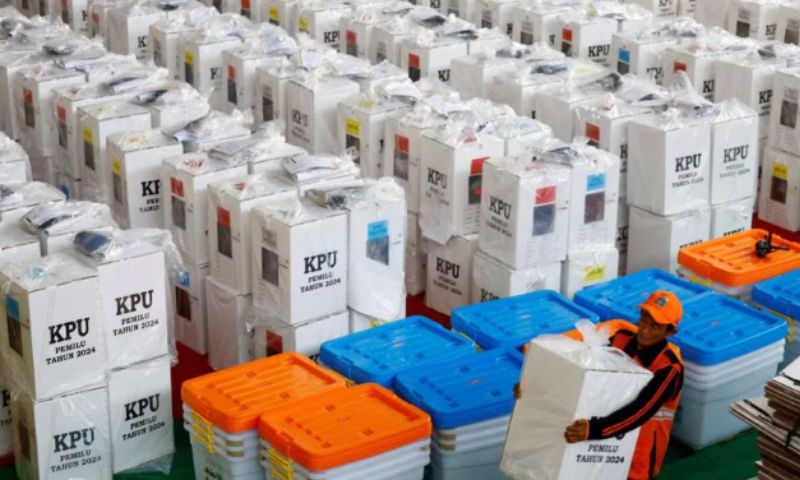TIMIKA: Indonesians cast their votes for a new president on Wednesday, with Defence Minister Prabowo Subianto emerging as the frontrunner despite lingering concerns regarding his human rights record and alleged support from outgoing leader Joko Widodo.
Projections suggest Subianto, a former military chief during the Suharto era, is poised to secure a majority, potentially avoiding a second-round run-off.
At 72 years old, Subianto has positioned himself as the leading candidate, blending populist rhetoric with promises to uphold the policies of Widodo, who remains immensely popular but is mandated by the constitution to step down after nearly a decade in office.
“We are committed to advancing prosperity for all Indonesians and continuing the progress initiated by previous administrations,” Subianto declared in a final appeal to supporters during a weekend campaign rally.
Over 205 million eligible voters are tasked with choosing between Subianto and his rivals, Anies Baswedan and Ganjar Pranowo, in what marks the fifth presidential election since the fall of the Suharto regime in 1998.
Polling stations opened at 7:00 am (2200 GMT Tuesday) in Papua, the easternmost province, and were scheduled to close at 01:00 pm (0600 GMT Wednesday) in Sumatra, located at the opposite end of the vast archipelago.
In Timika city, situated in the restive province of Papua, officials inspected makeshift polling stations constructed from logs and palm leaves as voters began to arrive, as reported by an AFP correspondent.
“I will vote for the candidate who I believe will best foster development in Papua,” stated 19-year-old voter Daton, underscoring the significance of the election in a region plagued by a long-standing separatist insurgency.
Subianto’s path to victory hinges on securing more than 50 percent of the vote and garnering at least 20 percent support in over half of the country’s provinces.
Human rights organizations have sounded the alarm over Subianto’s potential presidency, expressing fears of a regression in democratic freedoms, particularly in light of accusations that he orchestrated the abduction of democracy activists towards the end of the Suharto era.
Although Subianto was discharged from the military in 1998 over his alleged involvement in the abductions and faced visa restrictions from the United States, he has denied any wrongdoing and was never formally charged.
Subianto has since undergone a rehabilitation of his public image, bolstered in part by a sophisticated social media campaign targeting Indonesia’s youth, where he is depicted as an approachable figure.
A significant boost to Subianto’s appeal comes from his vice presidential running mate, Gibran Rakabuming Raka, the eldest son of Joko Widodo.
While Widodo continues to enjoy high approval ratings for presiding over a period of economic growth and political stability, allegations have surfaced regarding the misuse of government resources to support Subianto’s candidacy.
Criticism has also been directed at the circumstances surrounding Raka’s candidacy, with concerns raised over changes to age eligibility rules for high office candidates facilitated by Widodo’s brother-in-law, the former chief justice.
Subianto and his supporters have vehemently refuted allegations of impropriety, dismissing them as politically motivated attacks.
Despite these controversies, many voters either remain unaware of Subianto’s past or are willing to overlook it.
“It’s just smears from political rivals. I choose not to dwell on negative propaganda,” remarked 24-year-old voter Novita Agustina, underscoring a sentiment echoed by a segment of the electorate.


